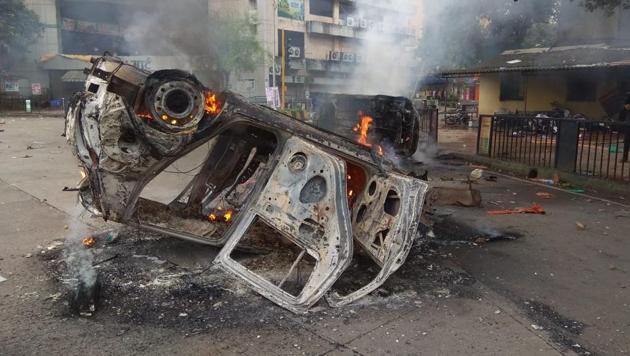Silent to violent: Have Maratha leaders lost control of protests?
Splinter groups in Navi Mumbai showed that the community leaders may not have their followers under control; the incidents forced Maratha Kranti Morcha to call off the bandh in Mumbai.
For most part, the Maratha agitation has been a disciplined and largely peaceful movement, but on Wednesday, splinter groups in Navi Mumbai showed that the community leaders may not have their followers under their control.

While Mumbai remained largely unaffected by the bandh called by Maratha Kranti Morcha, protestors blocked the Mumbai-Pune expressway in Navi Mumbai and there was violence when the police tried to remove them.
“This was not the face of protest we expected,” said Virendra Pawar, one of the coordinators of Maratha Kranti Morcha.
In fact, these incidents of unrest forced Maratha Kranti Morcha, the umbrella body of Maratha outfits, to call off the bandh in Mumbai.
“We suspect that the violent activity is a political conspiracy against us to derail the entire issue. In the last two years, we have held 58 silent marches and now suddenly we notice violent activities,” said Pawar.
Violence continued in areas like Kopar Khairane, Kalamboli, Thane and Vashi for hours after the bandh was called off. The highways were blocked, disrupting traffic. Public property, like state buses, were damaged. Police resorted to lathicharge and by the end of the day, Mumbai Police had arrested 447 people from 45 regions.
The Maratha agitation began in 2016-17 with silent marches and the major demand was 16% reservation for Marathas, who form a socially dominant group, in government jobs and education. The state government accepted this demand and is awaiting legal sanction for this quota from Bombay high court.
The recent Maratha protests are the second phase of their agitation, which have been named Thok Morcha (hit march). They’re meant to be more aggressive, but in contrast to the discipline of the silent marches, the protests of the past few days have seemed less organised and more volatile.
“It is true that some of our young community members have resorted to stone pelting, but we have formed teams to pacify and convince for peaceful protest. The violent turn is maligning the image of the entire community,” said Dnyaneshwar Gaikwad, one of the coordinators of the first Maratha Kranti Morcha, which took place in Aurangabad on August 9, 2016.
Not everyone in the central coordination committee of Maratha protests was convinced by Thok Morcha. “We feared that this would undo what we had earned in 58 silent marches. Some of us were of the opinion that the protest would lead nowhere as the case related to the reservation is pending in the High Court. Young leaders are not paying heed to our suggestions,” said a coordinator on the condition of anonymity while maintaining that it was very possible that opposing parties were trying to “infiltrate” the outfit and “hijack the agitation for political benefit”.
Pravin Gaikwad of Sambhaji Brigade blamed the violence on “immature” statements by chief minister Devendra Fadnavis and revenue minister Chandrakant Patil. “Yes it went haywire, but the instigating statements by these two politicians are to be blamed for the same. We never designed the protests this way.”
Perhaps most worrying is that the splinter groups that are resorting to violence appear to be beyond the umbrella body’s control. “We are not sure if they will listen to us now. We have decided to continue with peaceful sit-in protest in parts of the Marathwada,” said a leader from Aurangabad.




